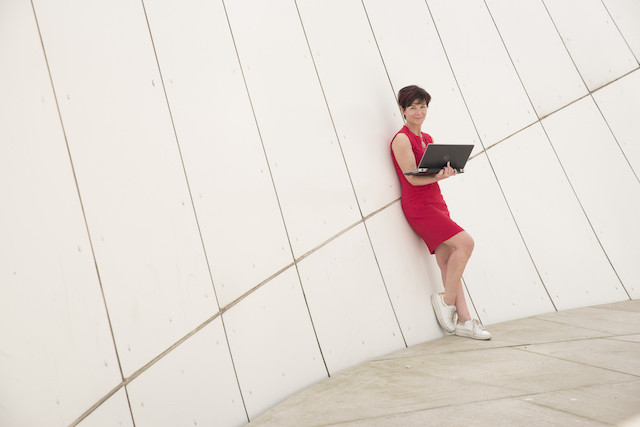Jess Bauldry: Tell us a bit about yourself
Patrizia Luchetta: I’m originally Italian. My parents emigrated here separately in the mid-60s. For the longest time I grew up in an Italian community.
I went to a Luxembourg school, but I was in an Italian school every free afternoon until the age of 15. I did two schools in parallel always with the thought I would go back to Italy, which never happened.
What was your career path?
I left high school at 16. I moved to Germany when I was 18 and started working for Ferrero. I decided to leave the company because I didn’t have opportunities to grow within the company. I then worked as PA for the Luxembourg Stock Exchange. While I was there I did a degree with the open university in environmental economics. I left when the person I was working for, Edmond Israel, retired. He was an amazing person to work for and when he left I didn’t see who else I could work for. Throughout my time there I had been a freelance journalist, so I decided to see if I could survive as a freelancer. It wasn’t really financially possible.
How did you end up working in politics?
I can’t remember exactly how it happened but I was in a working group for the LSAP. One day someone said they were recruiting.
I called Jeannot Krecké, who was MP at the time. He said there were always openings. I sent him articles I had written and, one day at 6am my phone rang. Jeannot said he was in charge of a report and he would give me a chapter to write. If he was happy, he would hire me. So, I wrote this chapter and three months later they hired me.
That brought me up to 2000. Then I met my partner, who is American. He returned to the US and I took the leap of faith, resigned and went with him to the US where my son was born. I worked for a communications company called Public Affairs.
We were living in the middle of nowhere in California, I didn’t see too many opportunities for myself, so we decided to come here to Luxembourg. We came back first for a short visit at Christmas [in 2005] and I contacted Jeannot to see if he was hiring. He said he wanted me back for March. So, I left my baby with his father, which was tough and started working for the LSAP which went back into government.
A year later, they asked if I would be interested in leading a research project in biotech. I did my initial exam for the civil service and worked my way up. It was an amazing experience. The integrated biobank was born out of that. We started it from scratch.
A lot of people were questioning it at the time. Some people said it would never fly. Today everyone seems to be proud of it.
So, why did you leave?
I decided to take a leave without pay, at the beginning of 2015, because I like to start things but when the job becomes something recurrent, I get a bit bored. It’s the seven-year itch.
I didn’t really see other opportunities within the ministry, to do something else so it pushed me to go back to the private sector. I really wanted to try full independence, which I never had before. If I look at all of the things I have done I realise that my strengths lie in strategic communication.
How are you making it work as a self-employed strategic communications expert?
My customer right now is a musician. I’ve another customer in the biomedical space.
To some extent I’m privileged because I’ve another 18 months in which I can return to the ministry if I wanted to. Obviously, your revenue goes down.
I’m happy I did it. I’m really enjoying the freedom I have now even if it’s a relative freedom. My goal is to stay independent until I retire and I don’t plan on retiring. I like working. I’m 53 now. If self-employment could be my last step, that would be nice. Because with each customer you have a different job. I like the variety.
What advice would you give other people looking to change careers?
In my experience, when you change, it’s because you are ready for it. During those first six months, you will ask yourself ‘have I done the right thing?’. I think it’s a journey. It takes about a year, if not more, to see where you’re going.
It is also important when you are self-employed to make the effort to network and meet people because you always get good advice.
Have you changed careers in Luxembourg? If you want to share your story, let us know by emailing [email protected] with a summary of your old and new careers.
